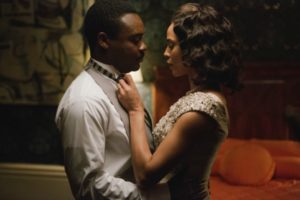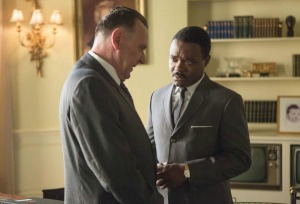Let me say, first off, that I don’t have a ton (if any) major complaints about this film. It’s timely, the performances are spot-on and do nothing to distract from the message, the camera and director (a relative unknown, African-American woman named Ava DuVernay who worked for years for the right to bring you this project) don’t shy away from the more horrific moments, and overall, the story is told in a way that both educates and entertains. The triumphs and struggles and horrors won’t be leaving me any time soon.
Selma opens with two scenes. The first is Martin Luther King (played by fabulous British actor David Oyelowo) and his wife, Coretta (Carmen Ejogo) getting dressed up to receive his Nobel Peace Prize in Oslo. King is clearly uncomfortable in the fancy clothes and situation, fearing what it will look like to his myriad followers, while Coretta seems relieved to be away from that pressure, at least for the night. King diffuses the tension between them with an easy flirtation, but it’s in this scene that we get our first look at DuVernay and Oyelowo’s MLK – a man who is determined and passionate, but who is also reflective, discouraged, and exhausted by the fight.

This scene is juxtaposed with one of four young girls skipping down the stairs at their church chatting about baptism – they are the picture of innocence, delightful in their youth, and are giggling the moment a bomb rips through the building, killing them all.
They’re there and in the next breath they’re not, a startling moment that jarred my heart and set the tone of the film. This is not, you would realize even if you did not know the story, going to be a happy movie.
And it’s not. MLK struggles – always, always struggles. President Lyndon Johnson* (Tom Wilkinson) has passed the Civil Rights Act, which desegregated the South by law, but not in practice. He wants to move on to his war on poverty but King insists they can’t leave things undone in the southern states, not when people were still victims of segregation and, more to the point, being denied the right to vote.
How would things ever change if the African-American people could not put into office politicians who understood and supported their cause? LBJ isn’t unsympathetic, he’s just more inclined to back burner the race issue for a while and move on to what he believes will be his legacy, and advises MLK to wait.
But four children are dead. They’re not the first, they won’t be the last, and the leaders of the Civil Rights Movement knew there was no time to waste. They, with MLK in the lead, need a staging ground. They need a town in turmoil, a hotheaded governor (and local sheriff), and they find it in Selma, Alabama.
*In regards to the kerfuffle regarding the “misrepresentation” of LBJ in this film, I have to say I don’t think it’s a big issue. LBJ is not painted as a monster in this movie. He’s not painted as a saint. I think history remembers him as a President who did much for the civil rights of American citizens, and Selma does nothing to discredit that legacy. Not every president would have signed the Civil Rights Act. Not every president would have signed the Voter Rights Act, debacle in Alabama or not. Whether he and King disagreed on the timing of things is a moot point and, if you’re focused on that aspect of the film, let me gently suggest that you’re missing the larger point. Which has nothing to do with the only major white character in the movie.

It’s not easy, getting things started in Selma. There’s a local chapter working for voting rights who feel as though King and his people are stepping on their toes. The first couple protests result in elderly people being brutalized and a young, unarmed African-American man – a war veteran – being carelessly shot by the police in front of witnesses…and not brought to justice (sound familiar?).
King tries repeatedly to get LBJ on his side, and the President continues to tell him to wait. There are multiple confrontations as they attempt to march from Selma to Montgomery against Governor Wallace’s orders, but as we know, King and his followers never give up.
They don’t give up. Through smear campaigns, being beaten in the streets, being chased down on horseback and whipped, teargassed, the death of a priest, and a hundred other atrocities, they keep marching. They go to court and win the right to march over the Edmund Pettus Bridge. Martin Luther King gives a speech on the courthouse steps while Wallace hides inside, while LBJ signs and announces the Voting Rights Act of 1965.
Selma is a powerful film. The cameras immerse the audience in the passion as well as the brutality, in the anger and the fear, and don’t let us look away. The King delivered on screen is not a hero. He’s not a god, he’s not infallible, and he’s not perfect.
He’s a man. He’s a tactician. He’s a performer and a strategist. He makes mistakes, he doubts himself and his path, he wishes things could be different, that he could be home more, that he could sleep more, that he wouldn’t have to die for what he believed in (he knew he would). He gets angry, he shoulders the guilt of the murdered, but in his soul he knows this is the only way to equality. The performance is both understated and masterful, much like the film. There’s no grandstanding, no unnecessary blood or violence, but sadly, there is also very little hope to be found as the credits roll.
I suspect that, in making this film, it was meant to be an homage to a man, to a movement, to a slice of American history that should not be forgotten. In the light of recent events in Ferguson, Florida, New York, Cleveland, and with the invalidation of many of the Voting Rights Act’s key successes in 2013, hopes that that the world has improved seem to dim. It’s hard to believe that we’ve overcome, that we’ve marched into the future, when it feels very much like we’re standing on those streets in Selma in 1965.
What is clear is that one man can make a difference, but he cannot win the fight alone. Maybe the hope in the film is that it might inspire a new generation of nonviolent protest, and that this time, the past shall be overcome indeed.
